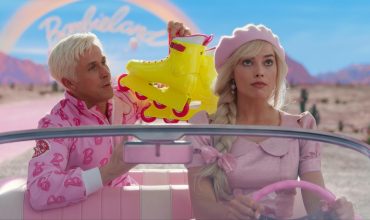Neil Armstrong was a Navy pilot who flew combat missions during the Korean War. Later, he was a test pilot for the forerunner organization to NASA and eventually became NASA’s first civilian astronaut in space. In 1969, he was the commander of the Apollo 11 Mission which was the moon landing watched by 600 million people worldwide. FIRST MAN takes us through the years leading up to Apollo 11 by showing us Neil Armstrong’s relationship with his wife Janet and his children, as well as the minutiae of the work, the testing and the public scrutiny of NASA’s Project Gemini and Apollo programs
Of course, we all know that the first human being to walk on the moon was Armstrong. Most of us know the second was Buzz Aldrin. Many of us are even aware that Michael Collins remained in lunar orbit in something called the Command Service Module—such is the historical importance of the Apollo 11 mission and the fame of its participants. However, the details of Neil Armstrong’s life are barely known at all.
When the movie begins, we learn that Janet and Neil’s two-year-old daughter Karen has a brain tumour. This affects the family deeply. Neil tries to take some control of her treatment by reading up on the science. He is trained as an engineer and his drive is to understand how a system operates, how it breaks down and then work out how to fix it. Unfortunately, one thing he can’t do is talk to anyone about how he is feeling, he can’t even find a way to discuss Karen’s cancer with Janet. Later, when he joins Project Gemini, Armstrong makes friends among his fellow astronauts, but still finds it impossible to open up to these men. His solution to crises that effect his emotional equilibrium is always to shut down and get back to work.
This leaves Janet as the family’s chief carer, internally and its social facilitator, externally. She smooths the way for the children when Neil is having difficulties and helps the wives of the other astronauts when times are tough. There are occasions when Neil would prefer to withdraw and disappear completely; a difficult feat for most people and utterly impossible for a NASA astronaut in the 1960s. Janet is built differently and sees it as her responsibility to stay connected. Thus the couple have fundamentally opposing ideas of how to deal with adversity and the pressures of fame.
Meanwhile, there are triumphs and notable setbacks with Project Gemini. (By the way, Gemini is continually pronounced “Gem-in-ee” but apparently this was common for some folks in the era.) The various missions are presented in great detail. There is equipment failure and sometimes fatalities as a result. The men being hailed as heroes in the media are doing something that earns them public adulation, but risks their own lives. They and the brightest minds of the era, are shown deliberating over every setback. We see multitudes of cigarette-smoking men in suits and crewcuts, arguing over plans to keep the space program viable. What these people decide will affect science, history and culture for years to come.
Director Damien Chazelle has built his reputation on the success of his movies WHIPLASH (2014) and LA LA LAND (2016). These award-winning, box office champs have brought him a $60 million budget and a special effects team that barely falters. The place where the visuals are questionable is in the overuse of hand-held camera and frequent reframing of shots, often in close up. There is also a stunning amount of digitally-manipulated shaking during spaceflight sequences to indicate the tremendous physical forces being dealt with. Some audiences won’t mind this, others will find the sheer amount of camera movement, excessive.
The story is based on the well-regarded Armstrong biography by author James R. Hansen. Some critics have described the film version as somewhat downbeat. FIRST MAN is simply not a celebratory, feel-good tale about the United States breaking barriers, planting flags and kicking butt. Possibly some people think it should be, however it’s a considerably more nuanced story about an extraordinary time in American and World history. The Soviet Union had beaten the USA into space. John F. Kennedy, who launched the Space Race, was assassinated. The Vietnam War was causing America to rethink its place and purpose internationally. At one level, Chazelle’s film attempts to be a time capsule that shows us what America used to be like. It points to the big picture while simultaneously keeping it relatable with the personal portrait of the Armstrongs.
Ryan Gosling’s performance is excellent, reserved and internalised. It put me in mind of some of Robert Redford’s work from the 1970s and ‘80s. Claire Foy is terrific as Janet. The role has the limitations of 1960s society and its expectations of women, yet Foy is, as always, enormously watchable. Corey Stoll, Kyle Chandler, Pablo Schreiber and Jason Clarke all do solid work in their roles. Their characters are quick sketches, nothing more. This reflects something of the purposeful detachment Chazelle chooses in his composition, editing and story choices. We are held away from the heart of the characters, ever-so-slightly. (Sidebar: It’s good to see Patrick Fugit and Lukas Haas as Gemini astronauts, I appreciate seeing child actors of yesteryear returning to the Big Screen.)
There were times when I felt what I was watching was OK, rather than excellent. I am supporter of human space exploration and both Yuri Gagarin (the first man in space) and Neil Armstrong are heroes to me. FIRST MAN, like Ron Howard’s 1995 crowd-pleaser APOLLO 13, owes a great debt to Phillip Kaufman’s 1983 film icon, THE RIGHT STUFF. And so in some sequences, I felt the familiarity of territory visited by previous movies. However, there are several moments that Chazelle’s film absolutely nails, the best of these being the moon landing itself. This is a beautiful, tense, extended sequence that shows us why Armstrong was chosen as the Apollo 11 commander and how inspiring human beings can be when led by our higher selves.
FIRST MAN is a worthwhile shot at portraying an elusive human subject. Like Clint Eastwood’s SULLY (2016), the movie has some difficulty creating a fictional version of a real-life hero, who is essentially a modest man who sees his greatest triumph as one small part of a larger life. These Baby Boomers and Greatest Generation men are, in some sense, difficult characters to crack in movies made by subsequent generations. How do you show the emotional impact of huge events on male characters who were taught that holding everything in, and never opening up, was the essence of being a functioning, responsible adult? It takes some craft and insight and Chazelle brings these to his new film. FIRST MAN runs for 2 hours and 21 minutes. (7.5/10)


